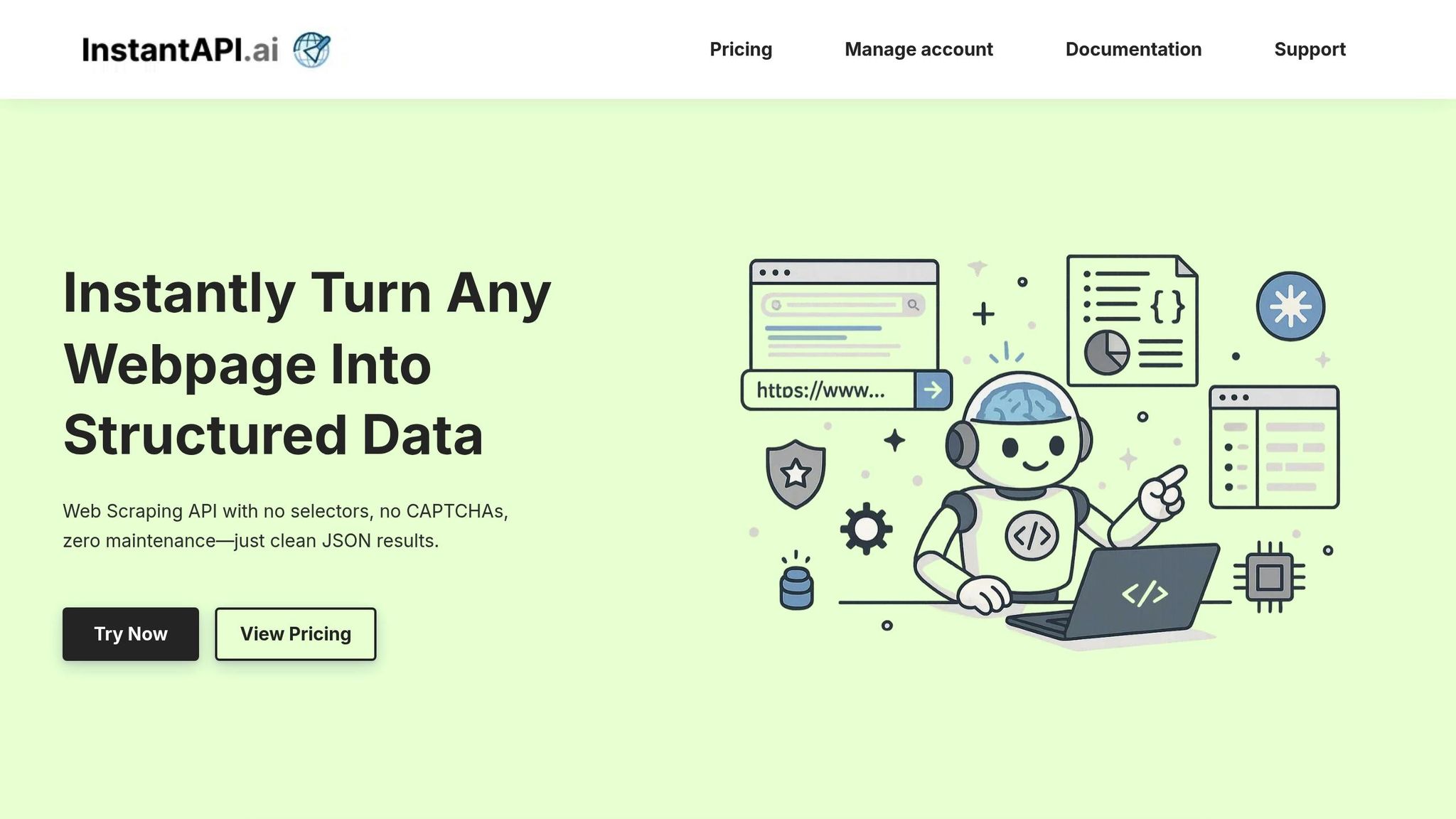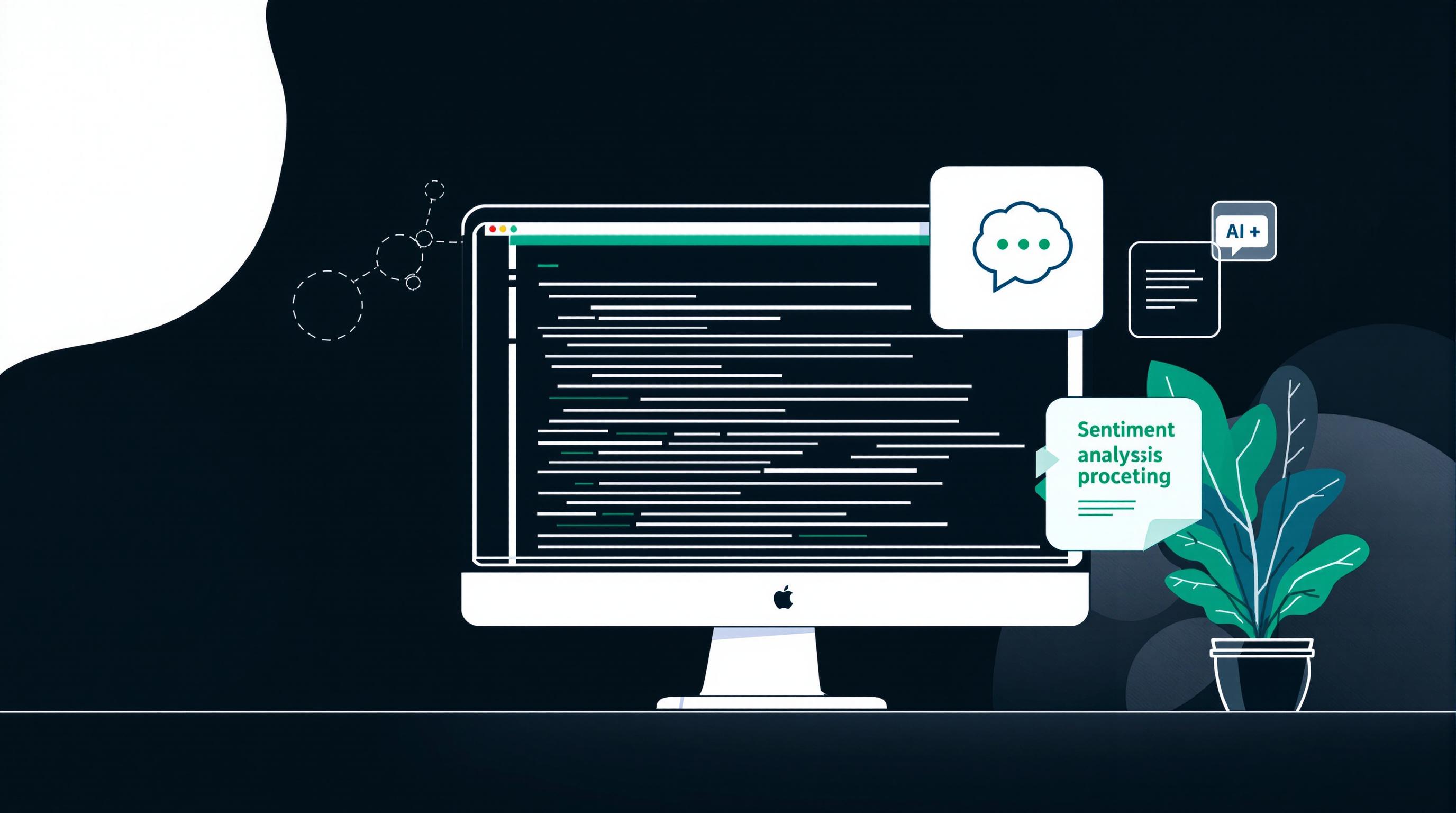Web scraping can transform how businesses manage customer relationships by automating data collection and enhancing CRM systems. Here's how it helps:
- Solve Key Challenges: Addresses lead generation and traffic issues - 65% of marketers struggle with these.
- Boost Results: Companies report a 20% increase in cross-selling, 17% better sales productivity, and 23% higher conversion rates.
- US-Specific Benefits: Automatically formats data (e.g., dates, currency, phone numbers) for seamless CRM integration.
- Key Steps: Validate data, follow legal guidelines, schedule updates, and ensure CRM compatibility.
With tools like InstantAPI.ai, businesses can scrape data efficiently at $0.005 per page, providing global coverage, CAPTCHA bypass, and custom formatting. When done ethically and securely, web scraping enhances CRM by delivering actionable insights and improving customer interactions.
Scrape ANY Website With AI For Free - Best AI Web Scraper
Web Scraping Tools for CRM
Choose web scraping tools that can handle complex data extraction reliably and work smoothly with CRM systems.
Common Web Scraping Tools
Look for tools that can manage JavaScript rendering, handle dynamic content, and process large volumes of data efficiently. Some essential features to prioritize include:
- JavaScript rendering for dynamic websites
- Automated pagination to navigate multi-page data
- Structured data output for easy CRM integration
Now, let’s take a closer look at what sets InstantAPI.ai apart for CRM-related tasks.
InstantAPI.ai Features and Functions

InstantAPI.ai simplifies CRM data integration with advanced capabilities and a high success rate of 99.99%+. Its technical features include:
- Geotargeting across 195+ countries
- Access to over 65 million rotating IPs
- Headless Chromium for seamless JavaScript rendering
- Intelligent CAPTCHA bypass for uninterrupted scraping
- Custom JSON schema mapping for precise data formatting
The pricing is straightforward: $0.005 per page scraped.
"After trying other options, we were won over by the simplicity of InstantAPI.ai's Web Scraping API. It's fast, easy, and allows us to focus on what matters most - our core features."
These features make it a strong choice for CRM data integration projects.
Choosing Tools for CRM Projects
When evaluating web scraping tools for CRM integration, the following factors are critical:
| Factor | Impact on CRM Integration | Priority Level |
|---|---|---|
| Data Format Compatibility | Ensures smooth import into CRM systems | High |
| Scalability | Handles increasing data demands effectively | High |
| Geographic Coverage | Supports global customer data collection | Medium |
| Update Frequency | Keeps data current and actionable | Medium |
| Support Quality | Addresses technical issues efficiently | Medium |
To get the best results, focus on tools that:
- Map extracted data directly to CRM fields
- Automate scraping on a schedule
- Include built-in validation and error detection
- Adhere to US data protection laws
Choosing the right tool ensures your CRM data collection strategy remains efficient, accurate, and compliant with regulations.
How to Add Web Scraped Data to CRM Systems
Finding Data Sources and Fields
Start by identifying data sources that can enhance your CRM records. Use publicly available information while ensuring compliance with data protection regulations.
Here are some useful data sources:
| Data Source | Key Fields | Update Frequency |
|---|---|---|
| Company Websites | Job titles, office locations, company size | Monthly |
| Professional Networks | Work history, skills, certifications | Quarterly |
| News Articles | Company developments, funding rounds | Weekly |
| Public Records | Business registrations, licenses | Annually |
Setting Up Automated Data Collection
Automating data collection can save time and ensure consistency. Tools like InstantAPI.ai allow you to set up collection parameters that align with established standards.
Adjust scraping schedules based on how often the data changes. Once collected, the data must be converted into a format compatible with your CRM.
Moving Data into CRM Platforms
To integrate scraped data into your CRM, follow these steps:
-
Prepare the Data
Standardize the data to match the structure of your CRM. Tools like InstantAPI.ai can help align fields such as:
- Contact details
- Company profiles
- Interaction records
- Custom field mappings
-
Ensure Data Accuracy
Run quality checks to keep your data clean and reliable. This process should include:
- Removing duplicates
- Verifying email and phone formats
- Standardizing address details
-
Secure Data Transfer
Use secure methods to move data into your CRM, such as:"The truth is, your data can tell you a story, but if your data isn't clean and up to date, you may as well be weaving fairytales." - Jacque Turbett, Writer
- Encrypted API connections
- Automated ETL (Extract, Transform, Load) processes
- Real-time synchronization
- Error monitoring and logging
Before importing the data into your CRM, use a staging environment to double-check its accuracy. To avoid overloading your system, schedule imports during low-traffic periods and opt for incremental updates instead of full database refreshes. This approach keeps your CRM data accurate and up-to-date without disrupting operations.
sbb-itb-f2fbbd7
Legal and Ethics Guidelines
US Web Scraping Laws
A 2021 ruling in the case of hiQ Labs, Inc. v. LinkedIn Corp. provided clarity on the legality of web scraping. The U.S. 9th Circuit Court of Appeals determined that scraping publicly accessible data does not breach the Computer Fraud and Abuse Act (CFAA). This decision has shaped the legal landscape for scraping data used in CRM systems.
Here are the key legal frameworks impacting CRM data collection:
| Legal Framework | Impact on CRM Data Collection | Compliance Requirements |
|---|---|---|
| CFAA | Permits scraping of publicly available data | Avoid accessing restricted areas |
| Copyright Law | Protects original content | Do not scrape copyrighted material |
| CCPA (California) | Governs personal data usage | Ensure transparency and obtain consent |
| Terms of Service | Site-specific regulations | Review and adhere to each website's terms |
Understanding these legal boundaries is just the first step. The next priority is safeguarding the data you collect.
Data Security Requirements
Protecting scraped data, especially when integrated into CRM systems, is critical. The 2018 Cambridge Analytica scandal highlighted the severe consequences of mishandling customer data, including financial penalties and damage to reputation.
To ensure compliance and secure your CRM-enriched data:
-
Implement Data Protection Measures
Use encryption, enforce access controls, and conduct regular audits to safeguard sensitive information. -
Document Data Sources
Keep detailed records, including timestamps, source URLs, scraping parameters, and compliance measures, to maintain transparency and traceability.
"It is likely that when a computer network generally permits public access to its data, a user's accessing that publicly available data will not constitute access without authorization under the CFAA." - Ninth Circuit Court
- Follow Ethical Practices
With the web scraping market projected to reach $5 billion by 2025, ethical practices are more important than ever.
Key security measures to consider include:
| Measure | Implementation | Purpose |
|---|---|---|
| Data Masking | Encrypt personal information during processing | Protect customer privacy |
| Access Logging | Record all data access activities | Maintain a comprehensive audit trail |
| Rate Limiting | Regulate scraping frequency | Prevent server overload |
| Data Retention | Define expiration policies for scraped data | Ensure data remains current and relevant |
When using web-scraped data to enhance CRM systems, make sure your approach aligns with both legal standards and ethical guidelines. Taking these steps can help you avoid compliance issues and maintain trust.
Web Scraping Tips for CRM Success
Data Quality Standards
The quality of your data plays a crucial role in how effective your CRM system will be. Accurate and validated data leads to better insights and smarter decisions. Here’s a structured approach to ensuring high data quality:
| Data Type | Validation Rule | Example Format |
|---|---|---|
| US Phone Numbers | 10 digits, optional +1 prefix | +1-555-123-4567 |
| US Addresses | USPS standardization | 123 Main St, Suite 100, New York, NY 10001 |
| Dates | ISO 8601 format | 2025-05-06 |
| Email Addresses | RFC 5322 standard | contact@domain.com |
Tools like Pydantic can make data validation more efficient. For example, in March 2023, Spotify, a Mailchimp client, implemented strict validation rules to clean up their subscriber data. Over 60 days, they reduced their email bounce rate from 12.3% to 2.1%, boosting email deliverability by 34%. This improvement generated $2.3M in additional revenue [1].
Managing Website Changes
Changes in website structures can disrupt your data collection process. To keep your CRM data flow uninterrupted, it’s essential to use strong monitoring and adjustment techniques. Here are some practical solutions:
- Dynamic Content Handling: Use tools like Selenium to render pages reliant on JavaScript.
- Selector Redundancy: Keep multiple CSS selectors for critical data points as backups.
- Automated Testing: Run daily checks to detect any structural changes early.
By combining these technical solutions with your business goals, you can ensure your CRM system remains effective and reliable.
Rules vs. Business Goals
Balancing compliance with business needs is critical. Here’s how to align your web scraping strategy with both legal and operational requirements:
| Business Goal | Compliance Requirement | Implementation Strategy |
|---|---|---|
| Real-time Data Updates | Rate Limiting | Add 5-second delays between requests |
| Complete Customer Profiles | Data Minimization | Collect only the necessary fields |
| Multi-source Integration | Website Terms of Service | Use authorized APIs whenever possible |
| Automated Collection | Anti-bot Measures | Rotate IP addresses using proxy networks |
Using specialized proxy services, such as residential proxies with rotation settings, can help maintain stable data collection while adhering to website policies and preserving system integrity.
Wrapping Up
Web scraping has emerged as a powerful tool for modern CRM systems, helping businesses collect customer data quickly and efficiently. By automating data extraction and syncing it with CRM platforms, companies can uncover deeper insights and create more tailored customer experiences. This sets the foundation for exploring tool performance and affordable CRM integration options.
The effectiveness of web scraping in CRM relies on maintaining high data quality and ensuring consistent collection practices. Features like global geotargeting and custom data formats allow businesses to gather and organize customer data in a way that aligns with local needs and regulatory requirements.
With advanced capabilities and a pricing model as low as $0.005 per page, organizations can scale their data collection efforts to match their CRM goals without heavy upfront costs. This affordability makes web scraping an appealing option for businesses of all sizes looking to improve their customer management strategies.
In the future, web scraping will continue to enhance CRM systems in areas such as:
- Real-time updates to customer data
- Integration of data from multiple sources
- Automated enrichment of customer profiles
- Data collection that prioritizes compliance
The key to success lies in leveraging these automated tools while strictly adhering to legal and ethical standards. This approach allows businesses to build stronger, data-driven relationships with customers while safeguarding compliance and data security.
FAQs
How does web scraping help improve CRM systems?
Web scraping enhances CRM systems by automating the collection of valuable customer data from online sources, such as social media, reviews, and forums. This data provides deeper customer insights, enabling businesses to create personalized marketing strategies and build stronger relationships.
To maximize the benefits, the scraped data must be cleaned and organized before integration into CRM systems. This ensures the information is accurate, actionable, and ready for analysis, helping businesses make informed decisions and improve customer engagement.
What legal issues should businesses consider when using web scraping for CRM purposes?
When using web scraping to gather data for CRM, businesses must ensure compliance with key legal regulations and ethical guidelines. For example, GDPR requires explicit consent when collecting personal data from individuals in the European Economic Area, while the CCPA grants California residents the right to know what data is being collected and request its deletion. Other regions, like Canada and Australia, have their own data protection laws that may apply.
Additionally, businesses should avoid scraping data that violates copyright laws or breaches a website's terms of service, especially when login credentials are required. The Computer Fraud and Abuse Act (CFAA) prohibits unauthorized access to websites, so it’s critical to ensure scraping activities are permitted. Finally, implementing strong data security measures is essential to protect sensitive customer information and maintain trust.
How can I effectively integrate web-scraped data into my CRM while ensuring quality and compliance?
To effectively integrate web-scraped data into your CRM, start by clearly defining your data objectives and identifying valuable sources that align with your goals. Use reliable web scraping tools to automate data extraction, ensuring the information is accurate, relevant, and up-to-date. Before importing the data, cleanse and validate it to maintain high quality and avoid errors in your CRM.
It's essential to adhere to ethical and legal guidelines by reviewing the terms of service for the websites you scrape and complying with regulations like GDPR or other applicable laws. Additionally, consider using data enrichment tools to add context and make the information more actionable for your sales and marketing teams. Following these practices will help you extract maximum value from web-scraped data while maintaining compliance and trust.


